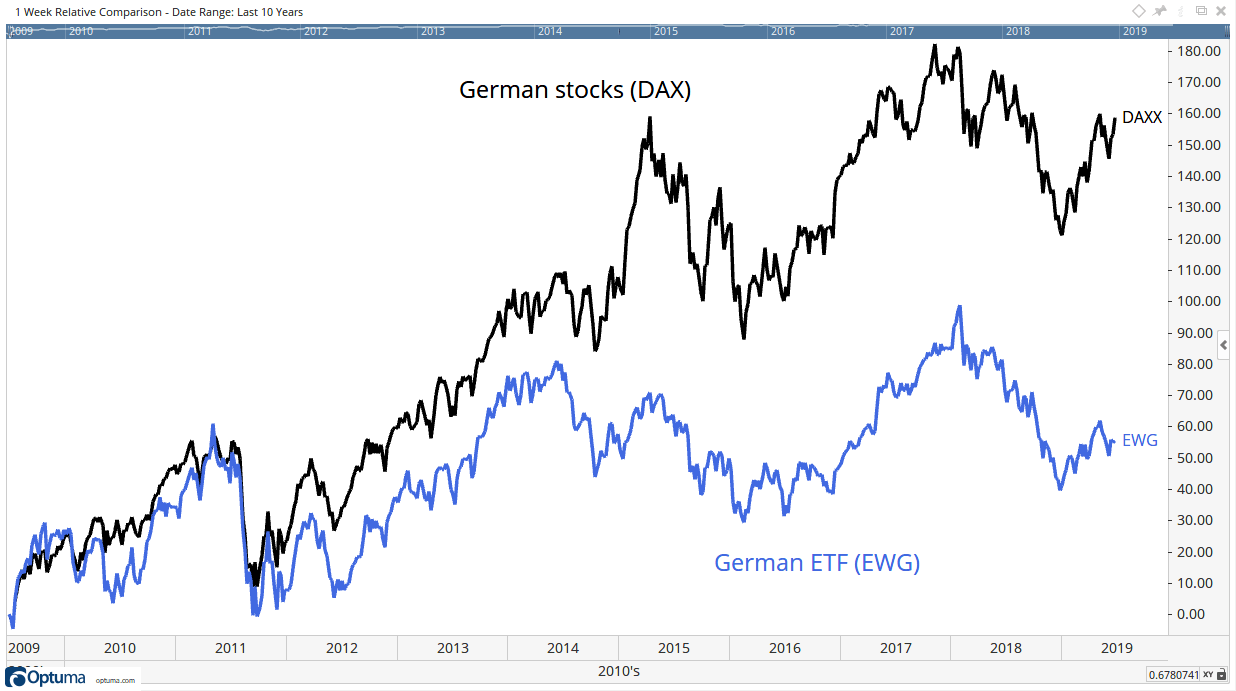Article Highlights:
- Many European countries have enjoyed strong bull markets for the past 10 years.
- But the returns on European exchange-traded funds (ETFs) have been much different.
- That’s because an ETF is really two trades.
Investors are worrying.
Trade war concerns keep popping up. Now the possibility of a shooting war with Iran is high.
There are more reasons to worry, and investors can’t ignore their concerns.
When they worry, many investors remember tips about diversification.
They believe diversification decreases risk. So, they hunt for diversification.
But many investors make a huge mistake — and it’s costing them a lot of money.
European Stocks Are Near New Highs
Trying to diversify their portfolios, investors might look at overseas markets such as Europe.
It’s true that many European countries have enjoyed strong bull markets for the past 10 years.
Among the biggest winners is Germany. The German benchmark index, the DAX, gained 159% in the past 10 years.
Germany’s economic strength over the past decade isn’t surprising.
Many investors knew Germany was the strongest European economy in 2009. The country dictated the terms of recovery for Greece and other euro zone laggards.
Knowing that, investors might have sought access to German stocks. The DAX’s returns show that was a good idea.
In the U.S., a well-meaning investor might buy the iShares MSCI Germany ETF (NYSE: EWG).
That exchange-traded fund (ETF) offers exposure to German stocks. But the chart below shows the returns are much different from the DAX.

EWG gained just 59% in the past 10 years.
This shows the problem with long-term investments in foreign stock markets.
U.S. Investors Have More Than Stocks to Consider
ETFs are designed for foreign markets.
An investor buys an ETF and owns a diversified basket of stocks in that market.
But really, that ETF is two trades.
One is obvious. It’s a trade in the stocks that the ETF holds.
The second trade is a currency trade.
Traders price the DAX in euros. That’s Germany’s currency.
U.S. investors usually buy ETFs in dollars. That’s their currency.
Changes in the currencies affect returns in the ETF. In this example, the dollar’s strength over the past 10 years dampened returns in EWG. Currency changes led to a loss of more than half the gains.
Now, investors might be thinking the dollar is set to decline in the next 10 years. That could make EWG a good investment in the future.
But that’s not the way it works.
ETF prices immediately reflect currency changes. This means the up moves and down moves of the currency affect the long-term total return.
That’s why ETFs on foreign markets are meant for short-term trading. They aren’t designed to match the country’s index in the long run.
Not knowing this can lead to disappointment for investors thinking they found low-cost access to expensive overseas markets.
Regards,

Michael Carr, CMT, CFTe
Editor, Peak Velocity Trader










